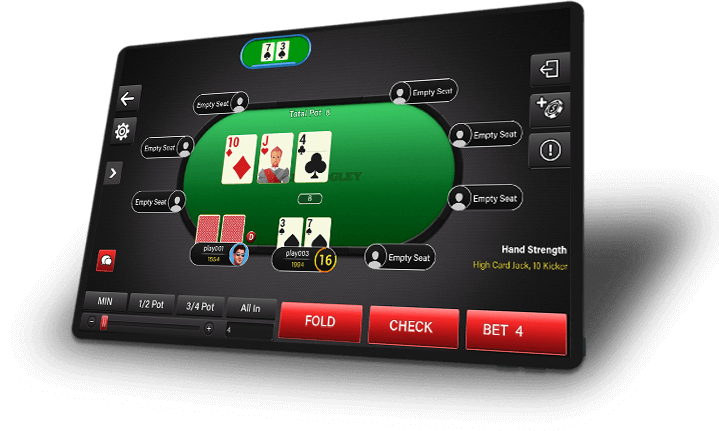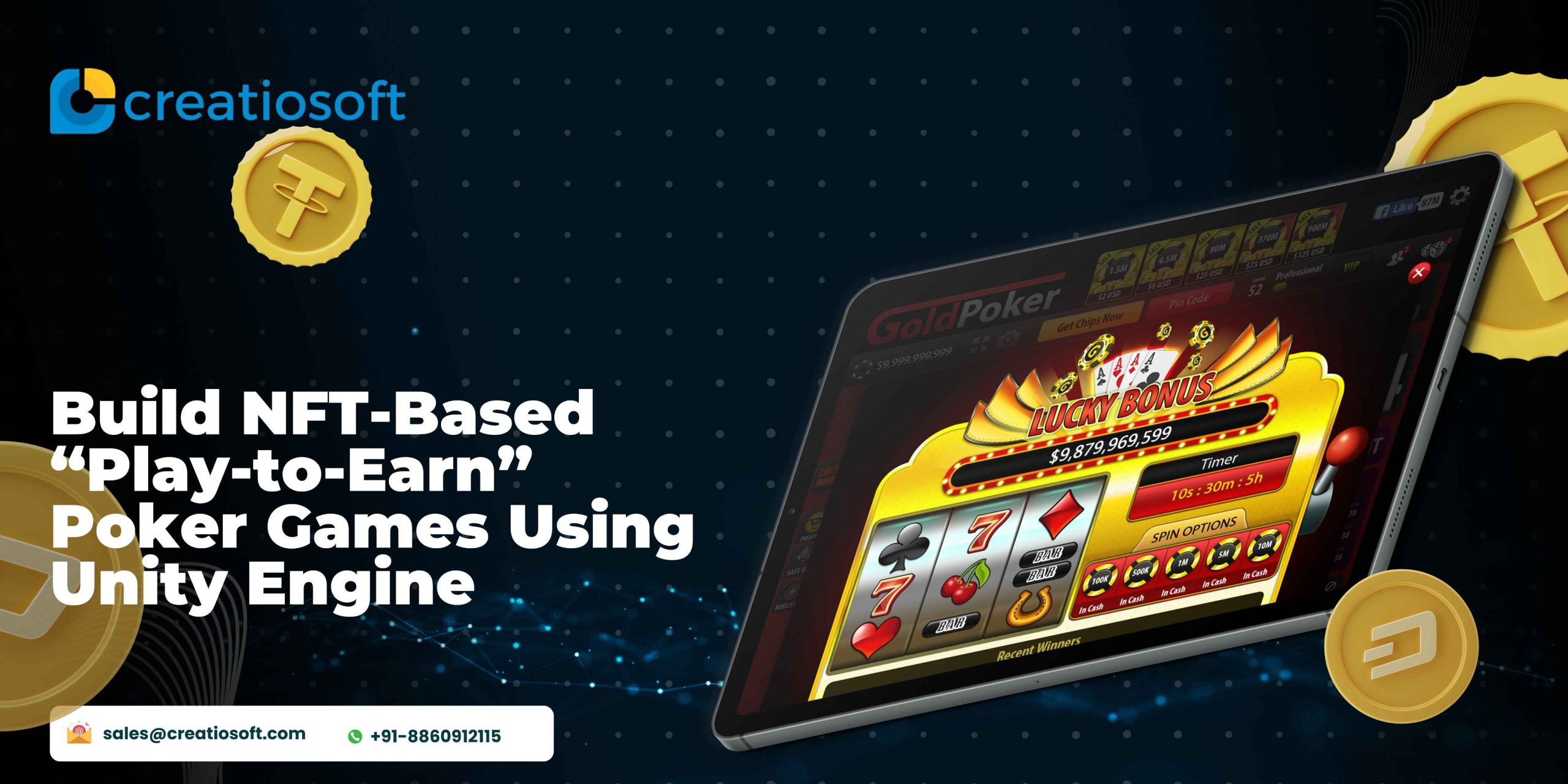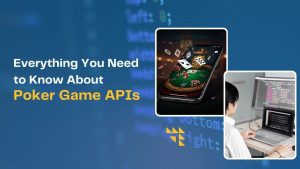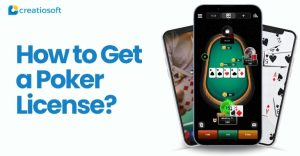“The future of gaming is online. It’s where the action is, and where the most exciting and innovative games are being developed.” – Peter Molyneux.
This statement explains the status of the gaming world today. The games are shifting to online platforms, making them available to everyone. Action, motion, and poker games are all now available online. Due to this, advancement is taking place in this field. A
NFTs have recently gained popularity in the gaming industry. They act as a means for users to get prizes and monetize their activities. Poker is one gaming genre that makes effective use of NFT. That is why the best NFT game development company utilizes NFT in their games.
Developers use the Unity Engine to develop NFT-based “play-to-earn” poker games. Game developers create innovative gaming mechanics, in-game economies, and incentive systems using NFT and Unity.
Let’s dive deeper into the field of NFT-based “play-to-earn” poker games utilizing Unity Engine:
What Are NFT-Based “Play-To-Earn” Poker Games?
Non-fungible tokens (NFTs) have enabled gamers to earn money while playing games. These are distinctive assets. It is not replicable or exchangeable for another item of equivalent value. These tokens prove ownership of digital material such as artwork, music, or even in-game.
An NFT poker game development company utilizes NFT to develop play-to-earn poker games. Players in these games can win rewards by playing the game efficiently. The NFTs provide various benefits to game participants. It makes sure that the incentives generated are unique. NFT enables gamers to take control of their prizes. It encourages gamers to keep playing and developing their skills. The rewards system allows players to gain an increase in valuation.
One of the most exciting elements of NFT-based play-to-earn poker games is the opportunity for new and inventive gaming techniques. Certain games may employ NFTs to represent rare and strong cards gained via gaming. Others may use NFTs to manufacture unique and valuable in-game objects. These can be traded for real-world dollars.
Concept of NFT-based “Play-To-Earn” Poker Games Using Unity Engine
Unity Engine is a new approach used by the NFT poker game development company in developing NFT-based “play-to-earn” poker games. It is a hybrid of regular poker games with the emerging technology of blockchain and NFTs.
These types of game development focus on engaging and rewarding game experiences. It also makes use of blockchain and NFT technologies to its advantage. These games may secure the awards’ uniqueness and scarcity by employing NFTs to symbolize them. Collectors will find them more precious and appealing as a result of this. These games can establish a decentralized and self-sustaining economy. Gamers can trade and sell their prizes at their convenience.
The Unity Engine delivers an immersive and high-quality gaming experience. It has realistic visuals, animations, and fluid and responsive gameplay. That is why most game development companies, such as mobile game development companies, use it. The Unity Engine also supports blockchain technology integration. It facilitates the usage of NFTs as incentives. You are also provided with a safe and transparent method of tracking ownership and transactions.
Steps To Build NFT-Based “Play-to-Earn” Poker Games Using Unity Engine
1. Outline the concept and game mechanics:
The theme, game type, and concept must be established before you start to develop an NFT game. The idea behind the NFT-based “play-to-earn” poker game is to provide players with a free, fair gaming environment. Along with this enables them to earn prizes in the form of NFTs. Players may use these NFTs to buy or trade in-game items on the blockchain exchange.
Several poker games will be available in the NFT-based “play-to-earn” game. As compensation for beating challenges or games, players might receive NFTs. Smart contracts guarantee transparency and justice. NFT Gaming Platform Development Company offers rating systems and a blockchain marketplace where NFTs may be bought and sold to earn bitcoin in addition to the standard poker regulations.
2. Drafting for the components of Play to earn poker games:
NFTs, tokens, and smart contracts are any blockchain game’s three main building blocks that an NFT poker game development company uses. You might have to put in much effort for these three elements to function well.
● Tokens:
Your NFT gameplay depends on this in many ways. These tokens will mostly be used for transactions by players. In order to determine which tokens will be used for transactions, it is essential to define the wallet. Both parties in the Ethereum scenario will require Ethereum-compatible wallets. Each wallet has advantages and disadvantages, and there are many of them. Before making the right decision, you may take these into account.
● Smart Contract:
This is a crucial aspect of gaming using NFT. You will make contracts for what occurs when player 1 wins and when player 2 wins. It will also specify how users will swap tokens, NFTs, and other gaming assets.
● NFTs:
This digital certificate verifies ownership of the specific digital file (image, document, figurine). Once you sell NFTs, you cannot buy another NFT of the same type. A signature NFT, for example, might be one-of-a-kind and cannot be duplicated.
3. Choose the NFT platform:
Selecting the correct NFT platform by an NFT poker game development company is critical for building NFT-based “play-to-earn” poker games with Unity Engine. Ethereum is the most popular platform for NFTs. It has a solid architecture for smart contracts and a big community of developers, users, and investors. Ethereum has also created layer 2 scaling solutions such as Polygon and Arbitrum. This enables quicker and cheaper transactions.
Other blockchain platforms, such as Binance Smart Chain, Flow, and Solana, have various capabilities and benefits but may have less developer support than Ethereum. While picking an NFT platform, developers should examine elements. These include target audience, game design, monetization strategy, and long-term sustainability.
4. Create the NFTs and integrate them into Unity Engine:
A. Creating the NFTs:
Anyone can create an NFT with a reasonable amount of cash to spend. The tools available on today’s NFT platforms enable you to develop various NFTs and include unlocked material in your files. If you want to make your own NFT, use the simple minting tools available on NFT markets.
Steps included in creating NFT:
- Choose a platform
- Decide on your artwork or digital asset
- Create a digital wallet
- Mint your NFT
- List NFT for sale
Mobile game development companies may build NFTs to represent other digital goods. The goods can be works of art, music, and movies on platforms like OpenSea, Rarible, and SuperRare. Minting an NFT includes adding the asset to the platform, deciding on a price, and specifying any additional information. This process includes royalties or conditions of use.
After the NFT is coined, it may be posted for sale on the platform. All this is followed by marketing through social media and other methods to improve its visibility. Significantly, developing and marketing NFTs is difficult. It may include legal and financial issues. If you have questions about any part of the procedure, it is advisable to consult a lawyer or financial counselor.
B. Integrating NFT into Unity Engine:
Choose a platform that works with Unity, then create an API key. This will allow you to incorporate NFTs into Unity. Make a Unity project and add the required packages to communicate with the API. The owner, token ID, and metadata of the NFT may be retrieved using C# programming. In interactive experiences, NFTs can serve as incentives or triggers.
5. Adding UI and graphics to the game:
Whether creating a game for consoles or smartphones, UI/UX should be your first focus. It needs to be user-friendly and engaging. Designing an engaging and successful game environment can help attain success. It is crucial to establish the user flow, utilize a consistent design language, keep the game basic, and take mobile users into account while designing an engaging UI/UX for an NFT-based “play-to-earn” poker game using Unity Engine.
The best NFT game development company incorporates NFT-based elements like prizes and collectables and is simple to play. Testing and iterating the design depending on user feedback can help find usability problems and improve the UI/UX. You may make a game that gamers will like by considering these important factors.
6. Testing the game:
The game should undergo extensive testing when it is produced to filter out any potential issues. Start by testing the fundamental mechanics, NFT integration, and rewards system for a Unity-based “Play-to-Earn” poker game. Make sure the game’s UI/UX is well-thought-out and user-friendly.
Conduct a closed beta test to gather input from actual players and then utilize debugging tools to find and resolve any problems. After fixing all issues, run a final test to ensure the game is stable and functions properly across all platforms. Use these methods to test the game and prepare it for release properly.
7. Launching the game
After you are happy with your game platform’s reaction, you can launch it. To launch the game, prepare your marketing materials, choose a launch day and time, make a landing page, and submit it to platforms and app stores. To entice gamers to try the game, run promotions offering cheap or free NFTs.
Keep an eye on comments and reply quickly to problems. Keep adding new features, fixing bugs, and improving the game to keep gamers interested. By adhering to these measures, you may launch the game effectively and draw in a devoted player base.
8. After launch, Monitor the game and update it:
Monitor game performance and adjust it often to maintain a profitable NFT-based “Play-to-Earn” poker game. To find areas for improvement, get user comments and examine game stats. To increase the game’s stability and user experience, fix bugs and problems as soon as they arise. Provide new features, content, and updates to keep the game interesting and fun.
Update the game’s material often to keep users interested, adding new levels, difficulties, and game styles. Deliver game updates on a regular basis to fix issues and provide new features. Use social media and in-game alerts to inform gamers of these upgrades. These guidelines will help you run a profitable NFT-based “Play-to-Earn” poker game and keep players interested.
The Bottom Line
The NFT Play to Earn gaming market is rapidly developing. With the Unity engine, it is possible to develop NFT-based Play-to-Earn poker games that are entertaining and lucrative. Several investors are considering this domain for the creation of new video games. Choosing the proper mobile game development company to work with may be beneficial in several ways.
Developers may construct a successful NFT-based “Play-to-Earn” poker game. It attracts and maintains players by following all stages. Creatiosoft is an experienced NFT poker game development company specializing in development. Connect with our team using the contact us form to develop the “Play-to-Earn” Poker Games Using Unity Engine.
FAQs
Q: How can I build an NFT-based “play-to-earn” poker game using the Unity engine?
A: To create an NFT-based “play-to-earn” poker game utilizing the Unity engine, you must be familiar with Unity development, blockchain technology, and NFTs. You may begin by developing the game mechanics, designing the user interface, and incorporating blockchain technology into the game.
If you do not want to get into this hassle, contact us and let us work on it.
Q: Why should I choose Creatiosoft for NFT-Based “Play-to-Earn” Poker Game development?
A: We have vast expertise in building high-quality games with Unity Engine, the industry’s most popular game engine. We have a team of professionals well-versed in NFT development and blockchain technology, allowing us to construct exciting and profitable “Play-to-Earn” Poker Games.
Q: What is the development process for NFT-Based “Play-to-Earn” Poker Games?
A: Our development process consists of numerous steps, beginning with idea and design and progressing through development, testing, and deployment. We collaborate closely with our customers during the process to ensure that the final result meets and exceeds their expectations.
Q: How do NFT-Based “Play-to-Earn” Poker Games generate revenue?
A: NFT-based “Play-to-Earn” Poker Games make income through a variety of mechanisms, including in-game sales, transaction fees, and revenue sharing with players. With our game creation and blockchain technology competence, we can help you optimize your income sources and maximize your earnings.
Q: How long does developing an NFT-Based “Play-to-Earn” Poker Game take?
A: The development duration for an NFT-Based “Play-to-Earn” Poker Game might vary based on the complexity of the game and the client’s individual needs. Nonetheless, our professional team works quickly to guarantee that the development process is finished in a fair timeline without sacrificing quality.
Q: How can I start developing an NFT-Based “Play-to-Earn” Poker Game?
A: Contact us and provide us with your unique objectives and goals. Our team will collaborate with you to establish a unique growth plan and provide you with an estimate for our services. Following that, we will begin the development process and collaborate closely with you to ensure the success of your NFT-Based “Play-to-Earn” Poker Game.






